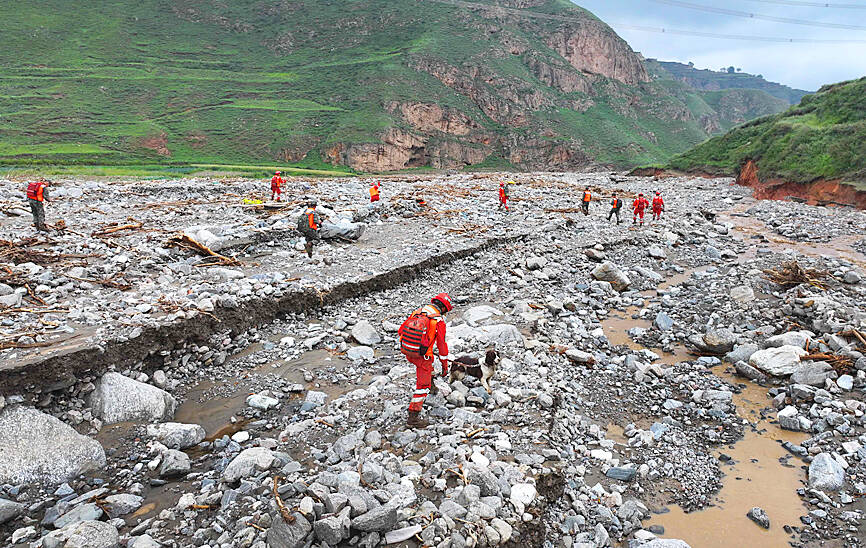At least nine people died in a flash flood in northern China, state media reported yesterday, with three others still missing, as the East Asian monsoon continues to unleash atmospheric chaos across the world’s second-largest economy.
The banks of a river running through the grasslands of the Inner Mongolia region burst at about 10pm on Saturday, the report said, washing away 13 people camping on the outskirts of the city of Bayannur, a major agricultural hub.
A search and rescue operation involving more than 700 people is under way, Chinese state news agency Xinhua said. One person has been rescued.

Photo: AFP
China has experienced weeks of extreme weather since last month, battered by heavier-than-usual downpours with the monsoon stalling over its north and south.
Weather experts link the shifting pattern to climate change, testing officials as flash floods displace thousands and threaten billions of dollars in economic losses.
Bayannur is an important national grain and oil production base, as well as a sheep breeding and processing center.
At the other end of the country, a three-and-a-half-month fishing suspension in the southern province of Hainan ended on Saturday, state media reported, after agricultural affairs officials ordered ships to shelter in port owing to persistent, heavy rain.
In the southwestern province of Sichuan, severe weather on Friday killed two people and injured three others at a beer festival in the city of Mianzhu, after a truss fell on them, a local police report said on Saturday.
The deluge in Inner Mongolia follows a deadly downpour in Beijing — just under 1,000km away — late last month, which killed at least 44 people and forced the evacuation of more than 70,000 residents.
The Chinese government last week announced 430 million yuan (US$59.9 million) in fresh funding for disaster relief, taking the total allocated since April to at least 5.8 billion yuan.

Japanese Prime Minister Sanae Takaichi yesterday lavished US President Donald Trump with praise and vows of a “golden age” of ties on his visit to Tokyo, before inking a deal with Washington aimed at securing critical minerals. Takaichi — Japan’s first female prime minister — pulled out all the stops for Trump in her opening test on the international stage and even announced that she would nominate him for a Nobel Peace Prize, the White House said. Trump has become increasingly focused on the Nobel since his return to power in January and claims to have ended several conflicts around the world,

UKRAINE, NVIDIA: The US leader said the subject of Russia’s war had come up ‘very strongly,’ while Jenson Huang was hoping that the conversation was good Chinese President Xi Jinping (習近平) and US President Donald Trump had differing takes following their meeting in Busan, South Korea, yesterday. Xi said that the two sides should complete follow-up work as soon as possible to deliver tangible results that would provide “peace of mind” to China, the US and the rest of the world, while Trump hailed the “great success” of the talks. The two discussed trade, including a deal to reduce tariffs slapped on China for its role in the fentanyl trade, as well as cooperation in ending the war in Ukraine, among other issues, but they did not mention

REASSURANCE: The US said Taiwan’s interests would not be harmed during the talk and that it remains steadfast in its support for the nation, the foreign minister said US President Donald Trump on Friday said he would bring up Taiwan with Chinese President Xi Jinping (習近平) during a meeting on the sidelines of the APEC Summit in South Korea this week. “I will be talking about Taiwan [with Xi],” Trump told reporters before he departed for his trip to Asia, adding that he had “a lot of respect for Taiwan.” “We have a lot to talk about with President Xi, and he has a lot to talk about with us. I think we’ll have a good meeting,” Trump said. Taiwan has long been a contentious issue between the US and China.

GLOBAL PROJECT: Underseas cables ‘are the nervous system of democratic connectivity,’ which is under stress, Member of the European Parliament Rihards Kols said The government yesterday launched an initiative to promote global cooperation on improved security of undersea cables, following reported disruptions of such cables near Taiwan and around the world. The Management Initiative on International Undersea Cables aims to “bring together stakeholders, align standards, promote best practices and turn shared concerns into beneficial cooperation,” Minister of Foreign Affairs Lin Chia-lung (林佳龍) said at a seminar in Taipei. The project would be known as “RISK,” an acronym for risk mitigation, information sharing, systemic reform and knowledge building, he said at the seminar, titled “Taiwan-Europe Subsea Cable Security Cooperation Forum.” Taiwan sits at a vital junction on